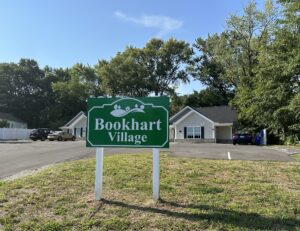 When Tennessee Out-Reach Center for Homeless (TORCH) Founder Sheila Michel looked around Anderson County in 2012, she saw that many of the county’s homeless had to go to Knox County to get substantial help, and she knew she had to step in.
When Tennessee Out-Reach Center for Homeless (TORCH) Founder Sheila Michel looked around Anderson County in 2012, she saw that many of the county’s homeless had to go to Knox County to get substantial help, and she knew she had to step in.
So, she opened what was then known as Trinity Out-Reach Center for Hope in January 2013 and worked to build programs that helped in the effort to end homelessness in Anderson County.
By 2015, she had hired Andy O’Quinn as the executive director for TORCH to help with the day-to-day activities of the nonprofit organization. O’Quinn had more than 15 years of experience working with homeless populations as the homeless service program manager at Helen Ross McNabb Center in Knoxville. Prior to that, he had worked as a team leader at a homeless shelter in Athens, Georgia.
The two leaders, along with TORCH staff, board members and a community of supporters, have helped develop a path out of homelessness for hundreds of families in Norris, Andersonville, Clinton, Oak Ridge, Oliver Springs, Solway and in the unincorporated areas of Anderson County.
Hotels to Homes
By 2020, TORCH spent about $45,000, mostly from church donations and government grants, to house homeless families with children and severely disabled individuals in hotel rooms throughout Anderson County.
During the 2020–21 pandemic, TORCH paid almost $70,000 for hotel stays for homeless families. The additional cost was covered by a COVID-related grant TORCH received from the Emergency Food and Shelter Program of the Federal Emergency Management Agency.
And, while this worked as a temporary solution, Michel and O’Quinn wanted to provide more of a home-like environment for families with children.
In most cities, the homeless are housed together in communal shelters while they look for jobs and apply for other government-funded services to help them move to permanent housing.
But Michel said she felt like it was a moral responsibility for the people of Anderson County to provide the children of the county with something better. She wanted to provide them with a place where they could feel normal and could concentrate on schoolwork and just being a child.
“We are a caring and innovative community,” O’Quinn said. “There is no reason at all that a child should be sleeping outside in a car or tent in Anderson County. It was our vision to have a place where a child could stay without ever even knowing or feeling like they were homeless.”
That’s when TORCH decided it was time to provide a better option for the homeless it served.
Bookhart Village and AGAPE House
In 2021, TORCH acquired three housing units that had formerly been used as transitional housing, known as AGAPE House, and in 2022, broke ground on six additional units for what would later be called Bookhart village.
Together, these properties can provide housing for up to nine families at a time, which is up to 48 people. All units are built to blend in so that both the neighbors and the children that stay feel like each property is just another home in the neighborhood.
Agape House and Bookhart Village were completed in 2023 and have been praised by homeless advocates.
TORCH’s model places an emphasis on families with children and secures non-congregate shelters by placing these families into single-family housing that the non-profit owns. The Oak Ridge Housing Authority (ORHA) manages these facilities on TORCH’s behalf, which then allows TORCH case managers to devote more time to helping families find the assistance they need to secure permanent housing.
Most of TORCH’s families stay in the non-congregate unit for about six months. TORCH uses the waiting list for public housing as their measure for how long a family can stay in one of their units.
So, in 2024, TORCH is sharing its success so that other smaller communities with no central communal shelter can duplicate their “no child sleeps outside” concept and end the cycle of homelessness.
TORCH has come a long way from its humble beginnings but has grown to provide innovative strategies for helping the homeless overcome the structural issues they face.
